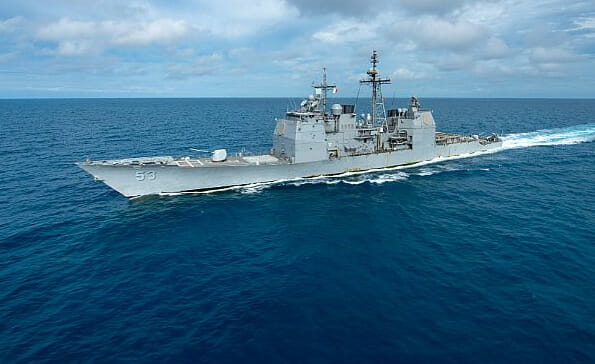On Friday videos circulated that showed hundreds of U.S. Navy officers gathered aboard the USS Theodore Roosevelt to cheer and applaud their commander just hours after he was relieved of his command. Captain Brett Crozier had been relieved of duty on Thursday by acting Secretary of the Navy Thomas Modly for breaking the chain of command and using an unclassified email to blast a warning about coronavirus on the ship.
The move came two days after a letter written by Crozier to his superiors was published in The San Francisco Chronicle. In that letter Crozier described the dismal circumstances of the nearly 5,000 sailors on the nuclear-powered aircraft carrier, which is now docked in Guam. More than 110 of the carrier’s sailors have tested positive for coronavirus, and Crozier had called for all but 10% of the crew to be removed so that the ship could be properly cleaned and sterilized, during which time the ship’s nuclear reactor could still be maintained.
Modly, who was named acting Navy Secretary late last year, had said on Wednesday that the letter itself was not the issue and said there would be no retaliation, and added that it was “what we want our commanding officers to be able to do.” A day later, Modly did stress that Crozier had shown “poor judgment” by sending the letter via email to at least 30 people and Modly added that the captain didn’t act professionally.
“It creates a panic, and it creates the perception that the Navy is not on the job, the government’s not on the job, and it’s just not true,” Modly told reporters.
As ClearanceJobs previously reported, the letter was not sent through secure email even though the ship is equipped with some of the most secure, cutting edge communications technology. Critics of the move have also noted that beyond the use of unsecure messaging, Crozier basically broadcasted the unreadiness of his crew, tantamount to a public pronouncement that his crew was unfit to fight.
Was Crozier a Whistleblower?
As for now Crozier won’t be thrown out of the Navy, but rather reassigned, while Modly told reporters on Friday that an investigation would eventually determine if the naval officer should face disciplinary actions.
Then there is the question of whether he should be provided any whistleblower protections.
“Navy leadership today cost itself tremendous credibility when it could least afford it,” said Rep. Jackie Speier (D-Calif.), chair of the House Armed Services Military Personnel Subcommittee as reported by USA Today. “Rather than stand with a brave leader who raised legitimate concerns about an imminent, serious threat, the Navy’s leaders prioritized their own appearances over their sailors’ lives. The Personnel Subcommittee, which I chair, will investigate this blatant act of whistleblower retaliation.”
Legal experts have already suggested that Captain Crozier shouldn’t have been removed from command.
“The removal of Captain Crozier as commanding officer of the aircraft carrier USS Theodore Roosevelt may have violated whistleblower laws,” said national whistleblower law expert Stephen M. Kohn.
“Military law permitted Captain Crozier to inform a wide range of officials of the life-threatening conditions aboard the USS Theodore Roosevelt, including any ‘substantial and specific danger to public health or safety,'” Kohn told ClearanceJobs via an email.
“Under legal precedent, the failure of the U.S. Navy to take immediate and effective steps to stop the spread of the Coronavirus on the USS Theodore Roosevelt could reasonably be viewed by Captain Crozier as ‘gross mismanagement,'” added Kohn. “Furthermore, the life-threatening conditions on the carrier unquestionably constituted ‘substantial and specific danger to public health and safety. Consequently, Captain Crozier’s memorandum to the Navy was a protected disclosure under law.”
The Military Whistleblower Protection Act, Title 10 U.S.C. § 1034, as amended, prohibits any person from taking, withholding, or threatening any personnel action against a member of the Armed Forces as reprisal for making or preparing any protected communications.
Kohn said this applies to any whistleblower-related communications, even if it is made to hundreds of people. According to the act, protected disclosures under the law include communications to “any person or organization in the chain of command; a Member of Congress; a member of a Department of Defense audit, inspection, investigation, or law enforcement organization; and any other person or organization designated pursuant to regulations or other established administrative procedures for such communications.”
There is also no requirement that a military whistleblower must raise concerns using a “secured system,” or must limit the scope of his or her disclosures to “take care” that concerns are not “leaked.”
“The opposite is the case,” said Kohn. “The law permits military whistleblowers like Captain Crozer to send their memos to every single Member of Congress, with no restrictions on the ability of Congress to immediately release the memo to the press.
“There is an even bigger issue here than whether Captain Crozier is protected under military law,” Kohn added. “Removing Captain Crozier from his duties sends the wrong message. It creates a chilling effect on others who are trying to save lives by taking prompt and aggressive action to alert the public to health and safety threats. During this crisis, disclosures like those made by Captain Crozier should be rewarded, not punished.”




